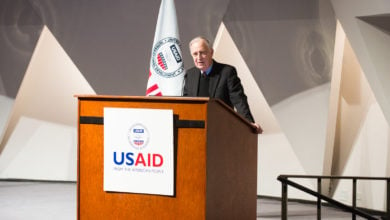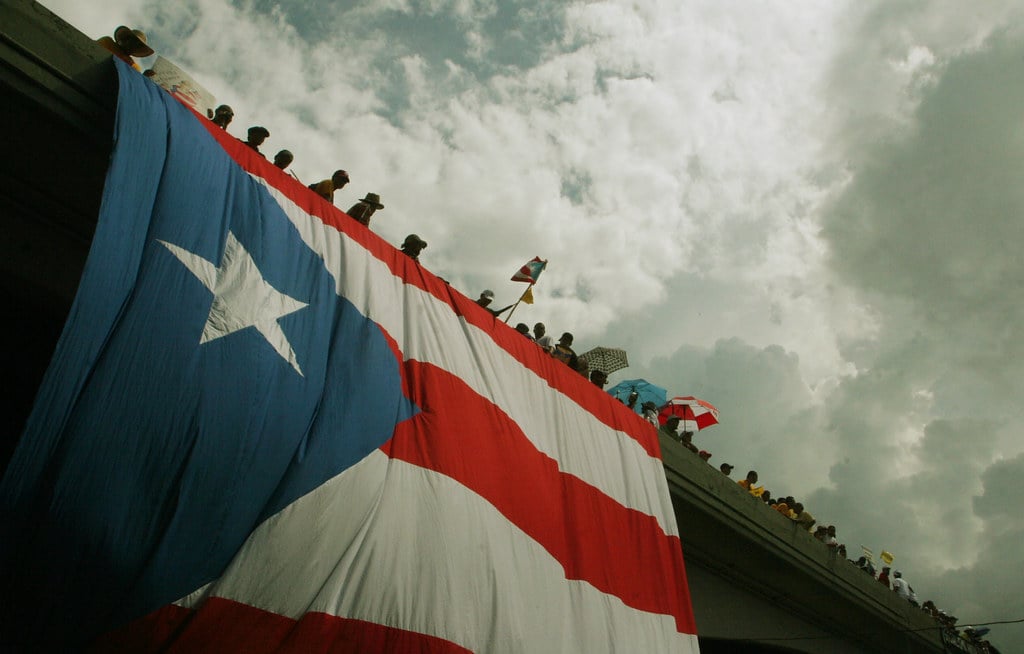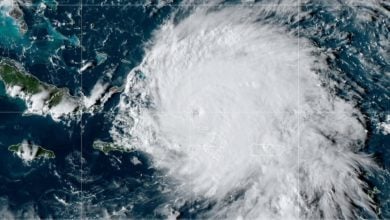FEMA aid has not been distributed, and Puerto Ricans must fend for themselves. Above, clearing a road.
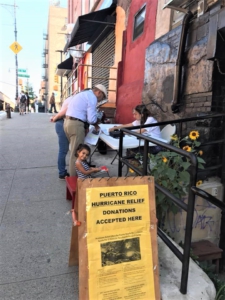
While the Trump administration paints a glowing picture of US relief efforts to Puerto Rico, Puerto Ricans in the diaspora are sounding the alarm that a catastrophic humanitarian crisis on the island has been made worse by severe U.S. government neglect. Seeking to learn the status of their families after Hurricane Maria struck on Sept. 20, Puerto Ricans here have discovered that FEMA aid is not being distributed and the people have been left to fend for themselves.
As of Sept. 29, nine days after the hurricane hit, tens of thousands of containers of food, water, and medicine remained docked in Puerto Rican ports due to logistical failings on behalf of the shipping companies and the destruction brought by the hurricane. U.S. government relief efforts are over-centralized in San Juan, forcing tens of thousands to flock to the nation’s capital for food water and medical aid. Those without cars and without gas to power their cars are walking for miles from surrounding areas to reach San Juan.
On Sept 29, the Governor of Puerto Rico, Carmen Yulin Cruz, made an urgent appeal to Washington. “We are dying here,” she said. “What we are going to see is something close to a genocide.” Trump responded to this plea to save lives by personally attacking the Governor and, incredibly, insulting the Puerto Rican people at this time of tremendous need by saying they “want everything done for them when it should be a community effort.”
To date, those gathering accurate information on the status of the 3.5 million people on the island, and mounting a serious effort to get desperately needed water, supplies and technicians there, are relatives and friends in the Puerto Rican diaspora communities here and their supporters.
Puerto Rican diaspora collects aid
In marked contrast to the U.S. government, the Puerto Rican diaspora has responded quickly, uniting to organize and fundraise for aid to their motherland. Dozens of aid drop off sites have sprung up here in New York City, which has one of the biggest Boricua communities outside of the island.
In particular, the historically Puerto Rican working class community in East Harlem, known as El Barrio, has come together to fundraise and collect donations for its motherland. The Justice Center in El Barrio has become a political center and a hub of relief efforts where hundreds of community members have come by in the past week alone to donate whatever they can.
On Sept. 28, a coalition of Boricua activists, organizers, non-profit workers, and more, from four states, gathered at the Justice Center or hooked in by phone to strategize short and long term relief efforts. The group also addressed the colonial status of the island and ways to politically educate the diaspora on the need for an independence movement.
“We’ve been organizing here at the Justice Center en el Barrio, in Brooklyn and the South Bronx to collect goods,” said Shawn Garcia, a Boricua organizer and Executive Director of Revolutionary Fitness, located in the Justice Center. All of the Justice Centers groups, the ANSWER Coalition, the Party for Socialism and Liberation and the People’s Congress of Resistance, have joined the community in collecting and sorting supplies to be sent to the island..
The response has been overwhelming.” We even surpassed what we thought we would get!” Garcia said. “We’ve also been accepting donations. On Tuesday we held a small benefit concert with el Barrio Poetix. We’ll be sending out our first crate of goods to Puerto Rico either this weekend or early next week.”
Additionally, a brigade of activists from Florida, including medics, counselors, and volunteers, will be leaving early next week to bring supplies and help with grassroots relief efforts.
Food rotting because there is no fuel for refrigeration
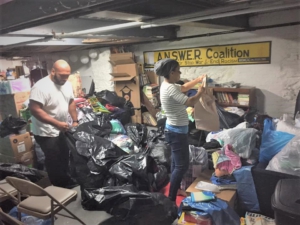
Garcia has centralized much of the information gathered on the status of Puerto Rico and its people. With an estimated 80 percent of the island’s electrical transmission system destroyed, “The island is still without lights, and back-up generators are few and far between” he said. “Aid is sitting at the docks, emergency personnel are moving slowly. Twenty out of Puerto Rico’s 78 municipalities still have yet to communicate with authorities on the island, so we don’t know what is going on there.”
“Only 30 percent of the hospitals are functioning, and few have functioning operating rooms. The death toll is officially around 25, but reports say that it can really be in the hundreds. We have been getting reports that there are bodies in the hallways of hospitals because people could not get the proper medical attention, and passed away. With fuel shortages refrigeration can’t be powered. Food is rotting.”
Additionally 42 percent of Boricuas don’t have access to drinking water. Many roads have been flooded or blocked with fallen trees and debris. Most cell towers have been knocked over or broken, leaving millions with no way to contact their loved ones. Some 80 percent of Puerto Rico’s agriculture has been destroyed. The damage has been described as “apocalyptic” by residents and observers.
Trump has turned relief efforts over to the generals and 20,000 troops. Now, Republican Senator Marco Rubio has urged Trump to give the Pentagon total control, allowing for outright martial law on the island.
Colonial subjugation worsens crisis
This catastrophic humanitarian crisis and the massive devastation has been exacerbated by the island’s colonial status.
The Department of Homeland Security initially denied requests from multiple members of Congress to waive the Jones Act, a 1920 U.S. law that has been imposed on Puerto Rico and requires all goods shipped there to first come to a U.S. port and be re-loaded on an American made-and-owned ship with an all-American crew. It is common for the Act to be waived in the aftermath of natural disasters to rush the delivery of critically-needed goods. After a massive outcry from people on the island, the Boricua diaspora and politicians from both major parties, the Trump administration announced Sept. 28 that it would waive the Jones Act for only 10 days.
While this is helpful, Garcia explained, “It provides only a small window of opportunity to get goods to Puerto Rico because it take 6-to-8 days for many of the ships trying to bring aid to get there.” It does nothing to allow the tons of food, water, medical supplies, and other necessities sent by Venezuela and Cuba, which cannot enter the island’s ports without approval from the U.S. government.
U.S. colonial policies have raised the cost of living on the island to 13 percent more than on the mainland U.S., with food costing nearly twice as much. The average income per capita on Puerto Rico is half of that of the poorest U.S. state, Mississippi, and half of those on the island live below the poverty level.
The poor and working class of Puerto Rico has been hit hardest most recently by the so-called PROMESA bill (Spanish for “promise”) signed into law last year. The bill hands over the Puerto Rican economy to a
non-elected board of seven ultra-wealthy fund managers, who have imposed harsh austerity measures to pay back a debt plus interest imposed upon the island. For example, Goldman Sachs expects an unbelievable $18.8 billion in interest on a loan of $2.5 billion.
Public schools, hospitals, and other public necessities have taken the first blow since PROMESA was passed, with hundreds of schools and hospitals being shut down around the island, and the money redirected to U.S. banks. Public services that the most needy rely on, like welfare and Medicaid, are
under threat. The minimum wage has been lowered to $4.25 an hour for those 25 years old and younger.
The island’s infrastructure has been long neglected due to cuts. The electrical grid was prone to frequent blackouts before the hurricane. With majority of the electrical grid now destroyed, the state-owned energy
company, Prepa, is threatened with privatization. U.S. corporations see it as a source of billions of dollars in revenues for themselves.
Wall St.vultures eye devastation as ‘opportunity’ to privatize
It is well known that natural disasters tend to expose the systemic as well as the infrastructural weaknesses of a society; the life or death circumstances facing 3.5 million people in Puerto Rico following Hurricane Maria is a devastating example of that fact. Puerto Ricans not only face the need for major reconstruction, they are also up against Wall Street banks and corporations that are becoming even more predatory.
“The island’s infrastructure was already in poor condition and the seizure of the land [following a disaster like Maria] by the US government and corporations has been looming over our heads for a while,” said Garcia. “Over the past few decades we’ve seen more aggressive privatization spreading across the island… are they deliberately holding onto the Jones Act or slowing down aid or letting things crumble further so there is more potential to come in and privatize and take even more ownership of the whole island?”
Garcia continued, “New York Governor Andrew Cuomo said ‘we’re going go to Puerto Rico and make it bigger and better.’ Bigger and better for whom? For Puerto Ricans or for private companies who want to seize the land and displace the people?”
The privatizers may have their plans, but they have not considered the determination of the Boricua community and its supporters, who have already demonstrated incredible strength and unity by responding quickly and extensively to Puerto Rico’s crisis. Mass anger and outrage at Washington’s criminal negligence of the island and its people is sure to deepen and widen, and may foreshadow a new stage in Puerto Rico’s struggle against U.S. colonialism. For many organizers on the ground, the struggle has only begun. “We really need to organize a people’s movement against this drive to privatize Puerto Rico,” said Garcia.
How to help
The grass roots effort to help Puerto Rico continues. Donations, and especially financial ones, are still much needed. Shipping containers alone cost $4,000 each. Contact: In East Harlem, the Justice Center in El Barrio, [email protected], 646-841-5476, or the Maestro Cultural Center in the Bronx, [email protected], 6446-299-6507.


